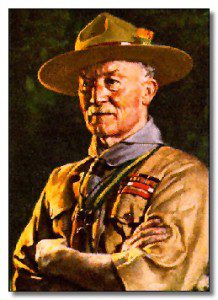
There were plenty of telltale signs:
Pup tents and tarpaulin lean-tos set in groupings around the park. Planted staves crowned with wildlife insignia. Backpacks and rucksacks neatly arranged around the picnic tables. The inviting scent of wood smoke wafting through the trees. And everywhere the playful chatter of boys and girls industrious in their Saturday morning activity. And at the entrance to my local park, a sign proudly identified those inside:
“Owasco Area Scouts,” it said.
When I snooped a little further, I learned what I had stumbled into was the annual “Camporee,” a weekend gathering of about 70 youngsters actively involved in the latest regional edition of the century-old scouting movement. Patrols (groups of roughly 10 scouts each) represented youth from Ajax, Pickering, Uxbridge and even an American group – Troop 67 from Catawisa, Pennsylvania (Uxbridge’s official twin community in the U.S.) Guiding the scouts – ages 10 to 14 – were about 35 adult leaders.
I spoke to Les Siddall, an assistant commissioner for scouting in the Owasco district.
“The annual jamborees go back 50 years,” he said. “The young scouts get a chance to learn skills – tying knots, giving first aid, building campfires and learning water safety…They’re doing canoe relay races on [Elgin] Pond.”
The scouts had transformed the park into 10 event locations, where teams with adult leaders, recognized problems, worked out collaboration duties and then completed tasks for points. I spotted one group administering a splint to someone in the role of an injured camper. Another bunch lashed poles and lines to build some sort of structure. And others learned canoe or campfire etiquette.
As I walked around the park and took in the activities engaging the youngsters, I thought about all the negative media their generation receives. Politicians, church leaders, police, business and media (yes, from time to time, I’m just as guilty as the next editorialist) tend to look for and find the vandalism, foul mouths and attitude of entitlement, without recognizing the upside of such positive youthful activity.
“Is it really competitive?” I asked Commissioner Siddall.
“Sure, but the main objective is fun,” he said.
For the record, the scouting movement owes its origins to a former lieutenant-general in the British Army, named Robert Baden-Powell. Serving in uniform from 1876 to 1910 in such parts of the world as India and Africa, among other campaigns, he assisted in the successful defence of the city of Mafeking in the Boer War. He wrote about 40 books on military history, adventures in the wilderness, life-skills for young men, and, of course, “Scouting for Boys,” published in 1908.
It was exactly 100 years ago that Baden-Powell staged a rally at Crystal Palace in London – it was the first time boys and girls assembled to support the scouting movement. It became an immediate world-wide phenomenon. Oddly, although Baden-Powell was a vocal anti-communist (who admired Benito Mussolini among others), during the Second World War, the Nazis proclaimed their distrust of scouting and labelled Baden-Powell a dangerous spy. A mountain in Nepal is named after him and he was nominated for the Nobel Peace Prize a number of times.
When Baden-Powell died, he was buried in Nyeri, Kenya, today a national historic site. On his gravestone is an inscription only boy scouts understand – a dot inside a circle, which means, “I have gone home.”
I remember my own experience as a Boy Scout back in the 1950s. We held our sessions in the local public school gymnasium. We spent most of our weeknights trying to master the basic tenets of scouting to earn badges and stripes. It seemed awfully regimented and competitive back then. And when we did get the chance to participate in outdoor jamborees, I recall mostly the smell of damp canvas, muddy boots and our staple meal – burned wieners and beans.
Les Siddall set me straight on present day scouting, however. It’s not so competitive, more open to cultural and religious diversity, and the wieners and beans are long gone.
“Later today, we’re staging the ‘Iron Chef Competition,’” he said.
This friendly contest pitted the best cook from each patrol being given a list of cooking ingredients – including cheese, eggs and greens – and coming up with the most interesting and delectable meal as a result. It seemed a fitting statement about a tradition that has learned how to keep up with the times.
“Scouting is all about teamwork and life skills,” Les Siddall said.
I’m only sorry I couldn’t stay around to sample the cuisine that resulted from the cooking contest. I’m sure I would have learned something about survival in the kitchen, if not in the woods.